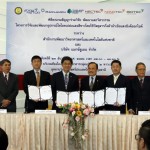For the past few years, Thailand has been promoting various initiatives that will enhance the ultimate goal of contributing to sustainable green environment and energy conservation. One of the initiative programs involves the need to replace all existing light sources in public, commercial, and private spaces with light-emitting diode (LED) type. LEDs are considered the most popular energy-efficient source of lighting. As an environmentally friendly solution, LEDs are also used in many application areas including indoor & outdoor lighting, signage, industrial sector, automobile industry, medical sector & many others.
However, as the saying goes, not all roads are paved with roses. This initiative certainly has its share of challenges which are of concerns to interested public and private sectors. Challenges such as costs of LEDs, deterioration of the LED chip, and overheating of LED package are just some example to be noted.
For this reason, there is a push to doing R&D that will minimize the various challenges and it now looks like there might be a light at the end of the tunnel. Recently a tripartite Research Collaboration Agreement was signed between MaxLumen Co.,Ltd., NSTDA, and Thailand Science Park under the research topic of “R&D of White Light Emitting Diode based on Zinc Oxide Optoelectronic Material”. The NSTDA research agencies that will be involve include BIOTEC, NANOTEC and NECTEC. The Integrated Nanosystem (INS) Laboratory will be the key research unit at NANOTEC that will be part of the collaboration team.
The research collaboration will be divided into two phases. The first phase will involve the development of zinc oxide substrate which the research group expects to be completed in two years. The second phase will involve the development of P-Type semiconductor. MaxLumen hope to be able to use the technology to produce and supply high quality raw materials for production of long lasting LEDs chips that will not deteriorate easily and will not over heat.
